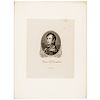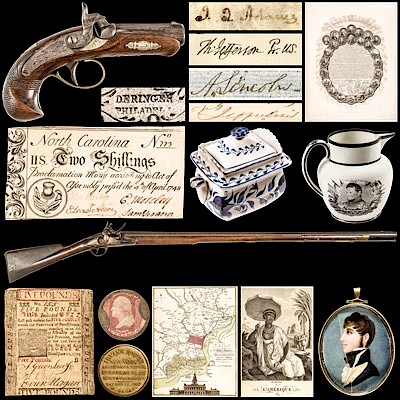Commodore Stephen Decatur Die Sunk Proof Oval Engraving on Card
Lot 216
Categories
Estimate:
$200 - $300
Absentee vs Live bid
Two ways to bid:
- Leave a max absentee bid and the platform will bid on your behalf up to your maximum bid during the live auction.
- Bid live during the auction and your bids will be submitted real-time to the auctioneer.
Bid Increments
| Price | Bid Increment |
|---|---|
| $0 | $10 |
| $200 | $20 |
| $300 | $25 |
| $500 | $50 |
| $1,000 | $100 |
| $2,000 | $200 |
| $3,000 | $250 |
| $5,000 | $500 |
| $10,000 | $1,000 |
| $20,000 | $2,000 |
| $30,000 | $2,500 |
| $50,000 | $5,000 |
| $100,000 | $10,000 |
| $200,000 | $20,000 |
| $300,000 | $25,000 |
| $500,000 | $50,000 |
About Auction
By Early American History Auctions
Oct 19, 2019
Set Reminder
2019-10-19 12:00:00
2019-10-19 12:00:00
America/New_York
Bidsquare
Bidsquare : Historic Autographs-Currency-Political-Americana-Militaria-Guns
https://www.bidsquare.com/auctions/early-american-history-auctions/historic-autographs-currency-political-americana-militaria-guns-4513
326 Lots of Rare, Historic Autographs, Americana, Civil War Era, George Washington, Abraham Lincoln, Black History, Revolutionary War Era, Colonial America, Federal Period, War of 1812, Colonial Currency, Indian Peace Medals & more... Early American History Auctions auctions@earlyamerican.com
326 Lots of Rare, Historic Autographs, Americana, Civil War Era, George Washington, Abraham Lincoln, Black History, Revolutionary War Era, Colonial America, Federal Period, War of 1812, Colonial Currency, Indian Peace Medals & more... Early American History Auctions auctions@earlyamerican.com
- Lot Description
War of 1812
Commodore Stephen Decatur Die Sunk Proof Engraving
Commodore Stephen Decatur, die Sunk Proof on India Paper measuring 4" x 4.75" on larger Card to 6" x 8", Official Bureau Printing and Engraving Portrait as used on Currency, Choice Crisp Mint.
Com(modore) S(tephen) Decatur Vignette. This handsome engraved oval portrait was used for United States Currency as a vignette on Fr. 305-12. Stephen Decatur (1779-March 22, 1820) was a U.S. naval officer who became famous for his exploits during the Tripoli War. He later served as a heroic commander in the War of 1812. He was killed in a duel by a fellow officer whose court-martial he had participated in years before.
Stephen Decatur is best known for the 16 February 1804 action in Tripoli when, as a lieutenant, he and 75 Sailors set the captured frigate Philadelphia on fire during a daring raid on Tripoli harbor.
Philadelphia had been surrendered to the enemy by her commanding officer, Captain Bainbridge, when she ran aground on a reef off Tripoli harbor. The Tripolitans took the captain and crew captive, and then floated and towed Philadelphia into Tripoli harbor for plundering.
Lieutenant Decatur and his crew, aboard Intrepid, entered Tripoli harbor disguised as a merchant ship flying British colors, with the mission of destroying the Tripolitan's prize. Under the ruse of losing their anchors in a storm, the cloaked Intrepid was given permission to moor alongside Philadelphia until morning.
A Tripolitan guard's warning that the ship's occupants were American came too late as Intrepid''s crew boarded Philadelphia, overcame the Tripolitans, and set the captured frigate ablaze. Decatur and his crew were later praised for their "performance of the dangerous service assigned them."
Born in Sinnepuxet, Maryland, on 5 January 1779, Stephen Decatur was appointed a midshipman in the U.S. Navy on 30 April 1798 and served on United States during the Quasi-war with France. He recaptured and destroyed Philadelphia as a lieutenant. He flew the pennant of a commodore during the War of 1812, and captured HMS Macedonian on 25 October 1812. In January 1815, while in command of President, he surrendered his ship to the British after a severe naval engagement and was taken prisoner. Decatur was released after peace was declared with Great Britain, after which he commanded the U.S. Navy Mediterranean squadron and secured the final treaty of peace with the Barbary Powers.
Decatur served as Navy Commissioner from 1816-1820. He was the recipient of congressional recognition and was presented with a sword for his service in Tripoli, and was awarded a gold medal for his distinguished service in the War of 1812. Decatur died in a duel with Commodore Barron on 22 March 1820, in Washington, D.C. He was initially buried in Washington, but was later reinterred in St. Peter's Churchyard in Philadelphia.
- Shipping Info
-
Early American provides in-house worldwide shipping. Please contact us directly if you have questions about your specific shipping requirements.
-
- Buyer's Premium



 EUR
EUR CAD
CAD AUD
AUD GBP
GBP MXN
MXN HKD
HKD CNY
CNY MYR
MYR SEK
SEK SGD
SGD CHF
CHF THB
THB












